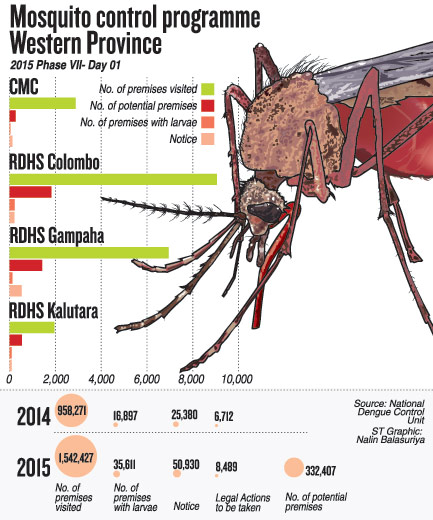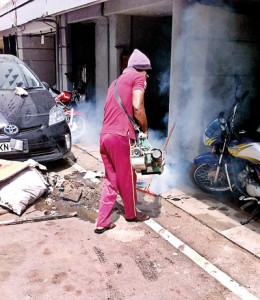News
Public apathy, garbage pose dengue threat: NDCU warns
Piles of bags left by the side of the road, empty yoghurt cups and curd pots along with the waste in which rain water collects are providing ideal mosquito breeding grounds raising the threat of dengue.

Clean up operations (above) and (below left) fumigation intensifies as the number of dengue cases rises
The prevailing garbage situation particularly in the Western Province and also the negligence of the general public are the primary causes for the increase in the number of dengue patients, during these past few weeks, officials said.
Dengue cases were kept at a manageable level until September. However since October the National Dengue Control Unit (NDCU) has recorded an increase in the number of cases. Officials said this could develop into an uncontrollable situation.
NDCU Consultant Community Physician Dr. Preshila Samaraweera told the Sunday Times that the mosquito population depends on the number of breeding places available to the adult insect. The more the breeding places the more mosquito larvae.
Dr. Samaraweera pointed out, that according to a recent survey carried out, nearly 39 percent of the mosquitoes breed in discarded containers. According to the survey nearly 50 percent of the dengue cases were due to infections from mosquitoes breeding in garbage dumped on the streets.
“If the garbage is collected early the number of dengue cases can be reduced by nearly 50 per cent,” Dr. Samaraweera said.
Dr Samaraweera added that whilst the local government authorities had taken positive measures in the battle against the sting, they lacked the resources to ensure that garbage was collected regularly.
Nearly 23,630 dengue cases have been reported this year alone, according to the statistics released by the Epidemiology Unit. Of these 12,223 cases were reported from the Western Province alone.
“There will be a high risk of dengue cases in the next two or three months if we don’t take any action,” Dr. Samaraweera said. She added that she feared the number of cases would increase to an unmanageable level.
Apart from the garbage crisis, officials also warned that the negligence of the general public could also be a contributing factor to the spread of the disease.
Recent statistics collected by the NDCU during a mosquito control programme in Colombo showed that 1,826 premises were potential dengue mosquito breeding places, while 228 sites contained mosquito larvae, of the 9,053 locations visited.
The NDCU together with the Presidential task force have conducted eight programmes islandwide this year. Nearly 1,542,427 premises were visited, and while 332,407 (21.55 percent) of these contained potential mosquito breeding places.
The programmes also discovered 35,611 (2.31 percent) of these locations contain mosquito larvae. The NDCU has also filed 8,489 court cases against the owners of those premises.
“If the public takes measures to destroy the breeding places we can drastically reduce the dengue mosquito population,” she said.
“We conduct so many dengue programmes because it’s crucial to eliminate the mosquito at its early stages,” she added.
Meanwhile several house to house campaigns are being conducted in the Colombo Municipality areas.
Its Chief Medical Officer of Health (CMOH), Dr. Ruwan Wijayamuni was alarmed at the number of potential mosquito breeding sites that were discovered during the campaigns. (269 houses (9.3 percent).
“The first week of November showed nearly 96 cases being reported from the CMC area, which is 50 percent less than the corresponding period last year (2014).
“Nevertheless this is still an endangering situation. I am especially worried about what the month of December will bring,” Dr. Wijayamuni said, adding that the cases were gradually piling up.
The CMOH has also written to all schools in the locality, urging them to establish a Dengue Patrol Unit in the school.
The unit which will comprise a science teacher and a student will be required to go around the school on a daily basis and submit a report to the principal on the number of breeding places discovered.
This initiative had come about following the discovery of several potential and actual dengue mosquito breeding places in a leading school in the City.
“Despite our repeated warnings, nobody is interested in destroying the breeding places and as a result the lives of the students and teachers are endangered,” Dr. Wijayamuni said.

